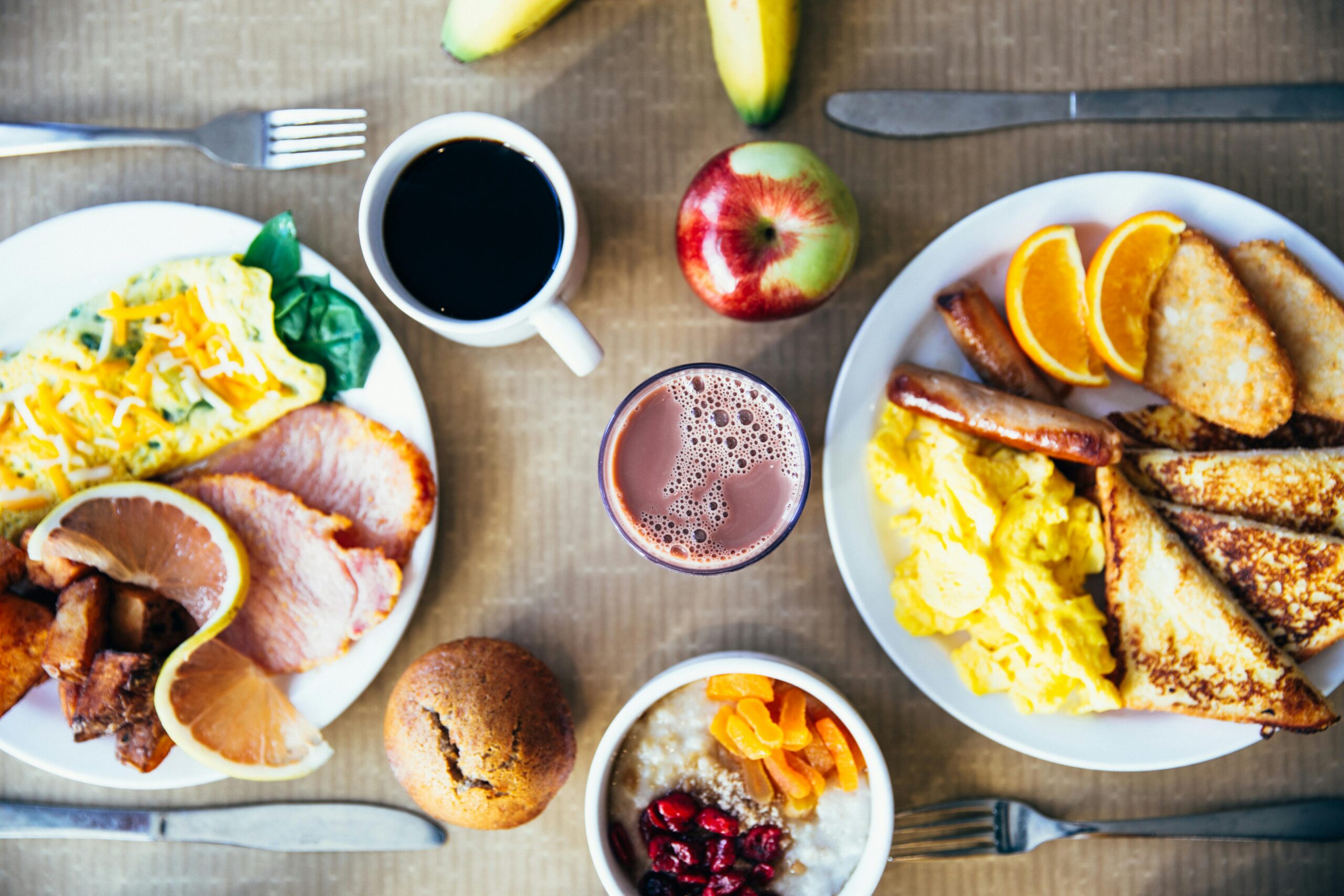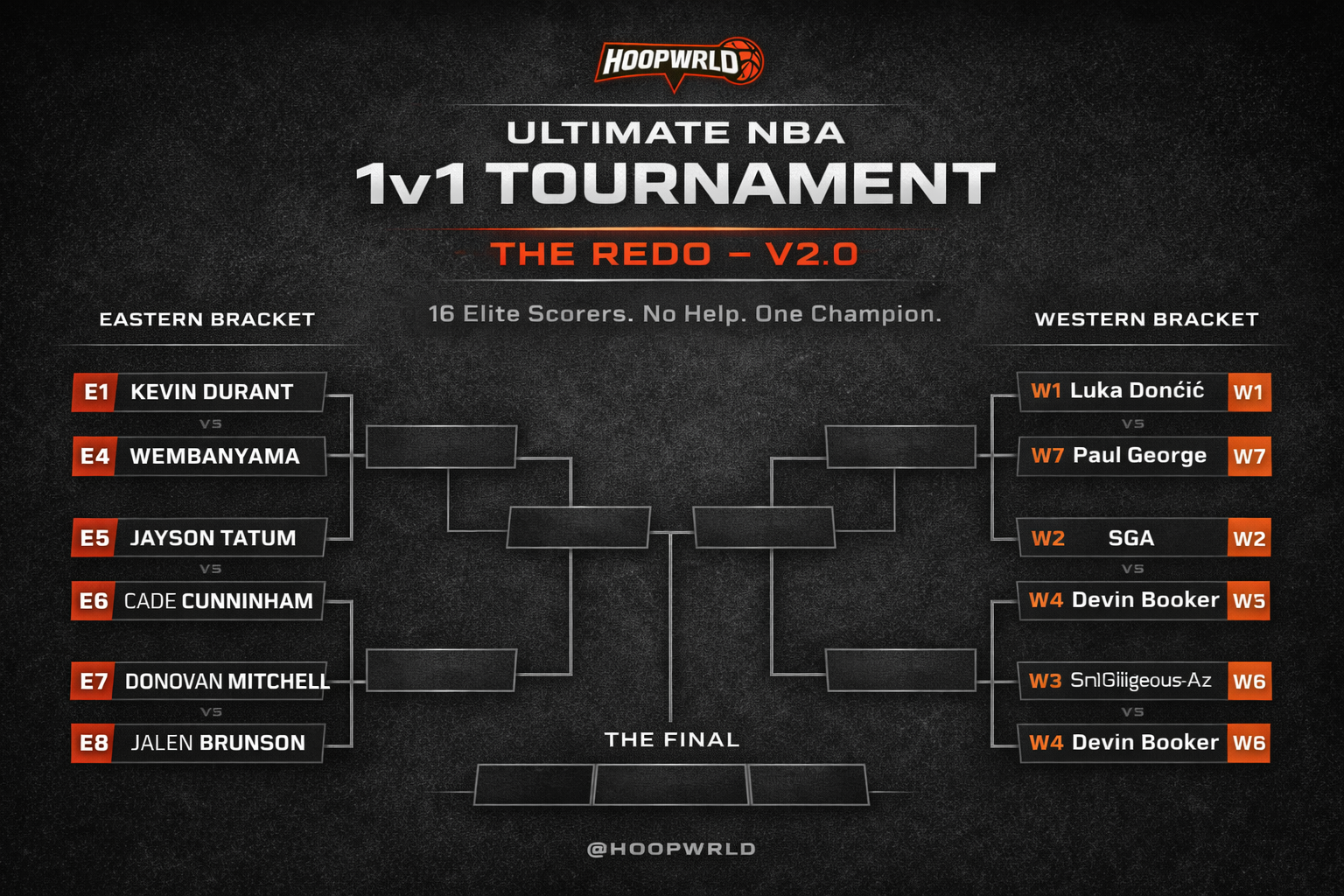The Three Master Builders: Understanding Macronutrients for Basketball Performance
Think of macronutrients as your three master construction crews. Each one has a specific job in building and maintaining your championship basketball house.
CARBOHYDRATES: Your High-Performance Energy System
What Carbohydrates Actually Do for Basketball Players
Carbohydrates are your body’s premium fuel source – think of them as the electrical system powering your basketball house. Every explosive first step, every clutch three-pointer, every defensive slide runs on carb power.
Here’s the science: Your muscles store carbohydrates as glycogen. During high-intensity basketball activities (which is basically everything you do on the court), your body breaks down this glycogen for instant energy. No carbs = no glycogen = no fourth-quarter gas tank.
Daily Carbohydrate Targets for Basketball Players:
• Training Days: 3-5 grams per pound of body weight
• Game Days: 4-6 grams per pound of body weight
• Rest Days: 2-3 grams per pound of body weight
Real Talk: A 150-pound point guard needs 450-750 grams of carbs on training days. That’s not a suggestion – that’s sports science. Make adjustments as you need.
The Carbohydrate Hierarchy: Choosing Your Energy Sources
TIER 1: Championship Carbs (Eat These Every Day)
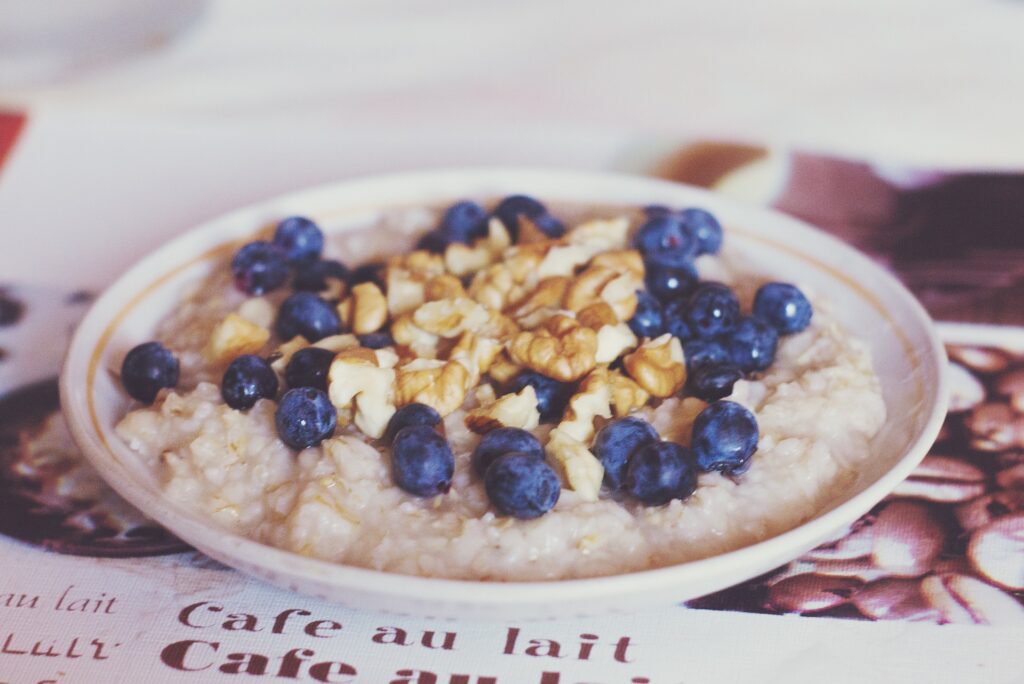
Oatmeal: The Steady Energy Producer
• Nutritional Profile: 1 cup = 54g carbs + 4g fiber + B vitamins
• Basketball Benefits: Provides 3-4 hours of steady energy, prevents energy crashes during long practices
• Scientific Edge: Complex carbohydrates release glucose slowly, maintaining stable blood sugar levels
• Pro Installation: Make overnight oats Sunday for grab-and-go fuel all week
Brown Rice: The Reliable Carb Foundation
• Nutritional Profile: 1 cup cooked = 45g carbs + B vitamins + magnesium
• Basketball Benefits: Versatile energy base, supports muscle function, aids recovery
• Scientific Edge: Whole grain provides sustained energy release, unlike refined rice
• Pro Installation: Batch cook 3-4 cups Sunday, portion for easy meal assembly
Sweet Potatoes: The Premium Performance Fuel
• Nutritional Profile: 1 medium = 27g carbs + 400mg potassium + vitamin A
• Basketball Benefits: Natural sweetness satisfies cravings, potassium prevents cramps
• Scientific Edge: Orange color indicates beta-carotene, supporting immune function during intense training
• Pro Installation: Microwave whole potato for 8-10 minutes when oven time isn’t available
Bananas: The Portable Power Pack
• Nutritional Profile: 1 medium = 27g carbs + 420mg potassium + vitamin B6
• Basketball Benefits: Perfect pre-practice fuel, natural packaging, rapid energy delivery
• Scientific Edge: Natural sugars provide quick energy, potassium supports nerve and muscle function
• Pro Installation: Buy varying ripeness levels – green for later in week, yellow for immediate use
TIER 2: Strategic Performance Carbs (Use Around Training)
White Rice: The Rapid Recovery Fuel
• When to Use: Post-workout only – within 30 minutes of finishing training
• Why It Works: Fast-digesting carbs rapidly replenish muscle glycogen stores
• Basketball Application: Perfect for back-to-back training days or tournament recovery
Sports Drinks: The In-Game Energy Source
• When to Use: During training sessions over 60 minutes or games
• Scientific Formula: 6-8% carbohydrate solution provides optimal absorption
• Basketball Application: Maintains blood glucose during intense, prolonged activity
The Carbohydrate Timing Strategy for Peak Performance
Pre-Training (3-4 hours before): 1-2g carbs per pound body weight Pre-Training (1 hour before): 0.5-1g carbs per pound body weight
During Training (>60 minutes): 30-60g carbs per hour Post-Training (within 30 minutes): 0.5-1g carbs per pound body weight
PROTEINS: Your Muscle Repair and Growth System
The Science of Protein for Basketball Performance
Protein is your basketball house’s construction and repair crew. Every jump shot, every sprint, every defensive stance creates microscopic damage in your muscle fibers. Protein rebuilds that damage stronger than before.
Here’s what most young players don’t understand: Basketball isn’t just cardio. The constant jumping, sprinting, cutting, and physical contact makes significant demands on your muscle protein synthesis – the process your body uses to repair and build muscle tissue.
Daily Protein Requirements for Basketball Athletes:
• Minimum Effective Dose: 0.8g per pound of body weight
• Optimal Performance Range: 1.0-1.2g per pound of body weight
• Maximum Useful Intake: 1.5g per pound of body weight
Science Check: A 150-pound player needs 120-180g protein daily for optimal recovery and performance.
The Complete Protein Champions: Premium Repair Crews
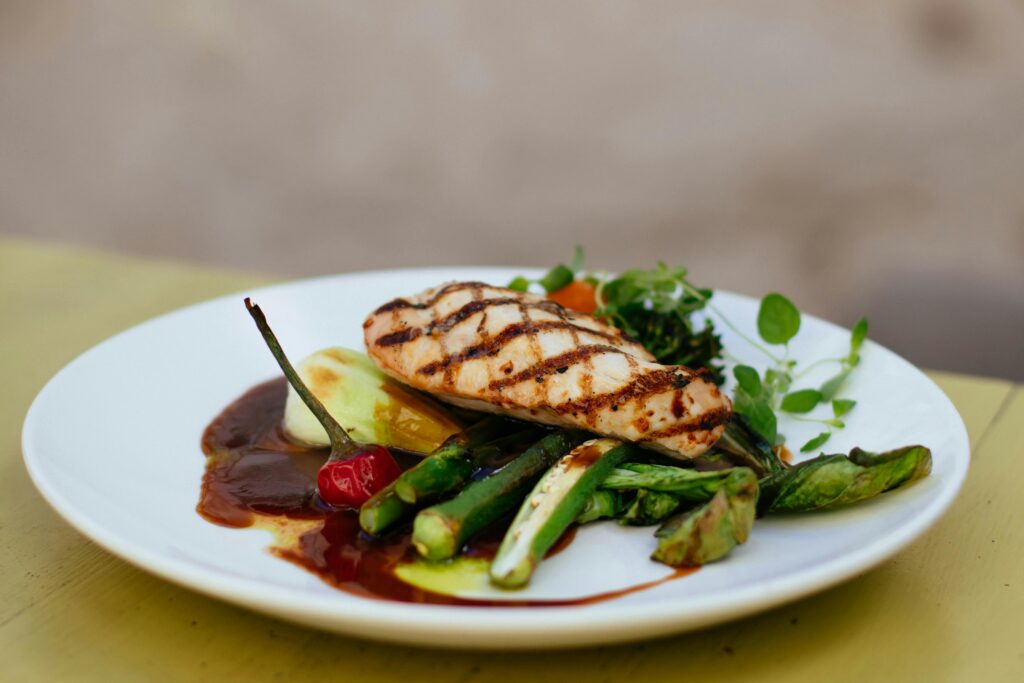
Chicken Breast: The Lean Muscle Builder
• Nutritional Profile: 4 oz = 35g complete protein + 0g carbs + 4g fat
• Basketball Benefits: High protein-to-calorie ratio, supports lean muscle development
• Scientific Edge: Contains all nine essential amino acids your body can’t produce
• Preparation Pro Tip: Pound to even thickness, cook to 165°F internal temperature
Eggs: The Biological Value Gold Standard
• Nutritional Profile: 2 large = 12g complete protein + choline + vitamin D
• Basketball Benefits: Choline supports brain function for better court vision and decision-making
• Scientific Edge: Eggs have the highest biological value (100) – meaning your body can use 100% of the protein
• Preparation Pro Tip: Whole eggs provide more nutrients than egg whites alone
Greek Yogurt: The Recovery Multitasker
• Nutritional Profile: 1 cup = 20g protein + probiotics + calcium
• Basketball Benefits: Probiotics support gut health, improving nutrient absorption
• Scientific Edge: Contains both whey and casein proteins for immediate and sustained amino acid release
• Selection Pro Tip: Choose plain varieties, add your own fruit to control sugar content
Milk: The Natural Recovery Drink
• Nutritional Profile: 1 cup = 8g complete protein + 12g carbs + calcium
• Basketball Benefits: Natural 3:1 carb-to-protein ratio ideal for post-workout recovery
• Scientific Edge: Research shows chocolate milk equals expensive recovery drinks for muscle recovery
• Application Pro Tip: Consume within 30 minutes post-training for optimal muscle protein synthesis
Protein Timing for Maximum Basketball Performance
Upon Waking: 20-30g protein to kickstart muscle protein synthesis after overnight fasting Pre-Training: 15-20g protein 2-3 hours before training to provide amino acids during exercise Post-Training: 25-35g protein within 30 minutes to maximize recovery window Before Bed: 20-25g slow-digesting protein (casein or Greek yogurt) for overnight muscle repair
FATS: Your Hormone Production and Joint Protection System
Why Basketball Players Need Dietary Fat
Fats are your basketball house’s insulation and weatherproofing system. They don’t just provide energy – they’re essential for hormone production, joint health, and absorbing fat-soluble vitamins that keep your body functioning at elite levels.
Many young players make the mistake of avoiding fats, thinking they’ll make them “fat” or slow. Wrong. Strategic fat intake actually improves performance by:
• Supporting testosterone production (crucial for muscle building and recovery)
• Reducing inflammation (faster recovery between training sessions)
• Protecting joints from the constant impact of basketball
• Enhancing absorption of vitamins A, D, E, and K
Daily Fat Requirements for Basketball Athletes:
• Minimum: 0.3g per pound of body weight
• Optimal Performance Range: 0.4-0.5g per pound of body weight
For a 150-pound player: 45-75g fat daily
The Elite Fat Sources: Premium Protection Systems
Omega-3 Fatty Acids: The Anti-Inflammation Specialists
Salmon: The Inflammation Fighter
• Nutritional Profile: 4 oz = 28g protein + 12g fat + 1.8g omega-3s
• Basketball Benefits: Omega-3s reduce exercise-induced inflammation, improving recovery
• Scientific Edge: EPA and DHA support brain function and reduce injury risk
• Budget Pro Tip: Frozen salmon costs 50% less than fresh, equal nutritional value
Walnuts: The Portable Brain Food
• Nutritional Profile: 1 oz = 4g protein + 18g fat + 2.5g omega-3s
• Basketball Benefits: Plant-based omega-3s support cognitive function for better court awareness
• Scientific Edge: ALA omega-3s convert to EPA and DHA in the body
• Portion Pro Tip: 1 oz = about 14 walnut halves, pre-portion to avoid overeating
Monounsaturated Fats: The Smooth Operators
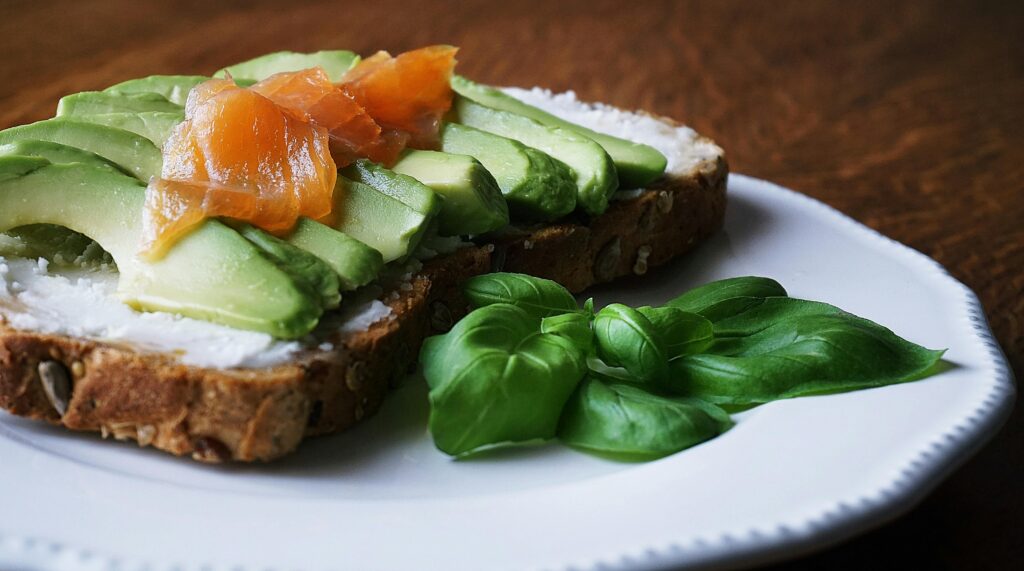
Avocado: The Potassium Powerhouse
• Nutritional Profile: 1/2 medium = 15g fat + 500mg potassium + fiber
• Basketball Benefits: Potassium prevents muscle cramps, supports nerve function
• Scientific Edge: Monounsaturated fats improve insulin sensitivity
• Ripeness Pro Tip: Buy at different stages, use within 3-5 days of optimal ripeness
Olive Oil: The Mediterranean Champion
• Nutritional Profile: 1 tablespoon = 14g monounsaturated fat + vitamin E
• Basketball Benefits: Vitamin E protects cell membranes from exercise-induced damage
• Scientific Edge: Extra virgin olive oil contains antioxidants that support recovery
• Usage Pro Tip: Use for cooking at medium heat, drizzle on vegetables and salads
Fat Timing Strategy for Basketball Performance
Avoid 2-3 hours before training: Fats slow gastric emptying, can cause stomach discomfort Include in post-training meals: Supports hormone production and vitamin absorption Daily distribution: Spread throughout meals for sustained satisfaction and hormone support
The Micronutrient All-Stars: Your Performance Support System
Micronutrients are like the specialized technical crew that keeps every system in your basketball house running at peak efficiency. You might not notice them day-to-day, but deficiencies show up fast in your performance.
Iron: Your Oxygen Delivery System
The Basketball Connection Iron deficiency is the most common nutritional deficiency in young athletes, especially female players. Low iron equals poor oxygen delivery to working muscles, which means you’ll feel like you’re playing in quicksand during the fourth quarter.
Performance Impact: Even mild iron deficiency can reduce endurance performance by 15-20%
Daily Iron Needs:
• Male players (14-18): 11mg daily
• Female players (14-18): 15mg daily
Elite Iron Sources:
• Red meat: 3 oz = 3mg heme iron (easily absorbed)
• Spinach: 1 cup cooked = 6mg non-heme iron + folate
• Fortified cereals: 1 cup = 4-18mg (check nutrition labels)
Absorption Maximizers:
• Combine iron-rich foods with vitamin C sources (citrus, berries, peppers)
• Cook in cast iron cookware (increases iron content of food)
• Separate iron meals from coffee/tea by 2+ hours (tannins inhibit absorption)

Calcium: Your Structural Foundation
The Basketball Connection Basketball is a high-impact sport that actually strengthens bones – if you’re getting enough calcium. Peak bone mass is built during teenage years, making adequate calcium intake crucial for long-term joint health and injury prevention.
Performance Impact: Adequate calcium supports muscle contraction and nerve signaling
Daily Calcium Needs: 1,300mg (ages 14-18)
Championship Calcium Sources:
• Milk: 1 cup = 300mg + protein + vitamin D
• Greek yogurt: 1 cup = 200mg + probiotics
• Canned salmon with bones: 3 oz = 325mg + omega-3s
• Fortified plant milks: 1 cup = 300mg (check labels)
Vitamin D: The Calcium Activation Key
The Basketball Connection Vitamin D deficiency is epidemic among indoor athletes. Without adequate vitamin D, your body can only absorb 10-15% of dietary calcium, regardless of intake.
Performance Impact: Vitamin D supports immune function, bone health, and muscle function
Daily Vitamin D Needs: 600 IU minimum (many experts recommend 1000-2000 IU)
Natural Vitamin D Sources:
• Sunlight exposure: 15-20 minutes daily with arms/legs exposed
• Fatty fish: 3.5 oz salmon = 360-700 IU
• Fortified milk: 1 cup = 120 IU
• Egg yolks: 2 large eggs = 80 IU
Magnesium: The Muscle Function Manager
The Basketball Connection Magnesium is involved in over 300 enzymatic reactions in your body, including energy production and muscle contraction. Deficiency leads to muscle cramps, poor sleep, and reduced exercise performance.
Performance Impact: Adequate magnesium prevents exercise-induced cramps and supports quality sleep
Daily Magnesium Needs: 410mg (males), 360mg (females)
Magnesium MVPs:
• Pumpkin seeds: 1 oz = 150mg (also provides zinc)
• Dark chocolate: 1 oz = 64mg (choose 70%+ cacao)
• Almonds: 1 oz = 80mg + vitamin E + healthy fats
• Spinach: 1 cup cooked = 157mg + iron + folate
Hydration: Your Body’s Cooling and Transport System
The Science of Hydration for Basketball Performance
Your body is approximately 60% water, but your blood is 90% water. During basketball, you lose 1-3 liters of fluid per hour through sweat. Even 2% dehydration (3 pounds of fluid loss for a 150-pound player) reduces performance by 10-15%.
What Dehydration Does to Your Game:
• Reduces blood volume, making your heart work harder
• Impairs temperature regulation, leading to overheating
• Decreases cognitive function, affecting decision-making
• Reduces muscle power output and increases fatigue
The Hydration Hierarchy for Basketball Players
Water: Your Baseline Hydration System
• Use for: Daily hydration, training sessions under 60 minutes
• Daily target: 1 oz per pound of body weight + 16-24 oz per hour of training
• Quality check: Urine should be pale yellow throughout the day
Sports Drinks: Your Performance Hydration System
• Use for: Training over 60 minutes, games, hot/humid conditions
• Scientific formula: 6-8% carbohydrate solution + electrolytes
• Timing: 6-8 oz every 15-20 minutes during activity
• DIY version: 1 cup water + 2 tablespoons sugar + 1/4 teaspoon salt
Electrolyte Balance for Peak Performance
• Sodium: 200-300mg per hour during prolonged exercise
• Potassium: Abundant in foods (bananas, potatoes, coconut water)
• Magnesium: Often overlooked but crucial for muscle function
The Champion’s Nutrition FAQ: Separating Fact from Fiction
“Is Sugar the Enemy of Athletic Performance?”
The Truth: Sugar isn’t inherently bad – timing is everything.
Sugar is simply a fast-acting carbohydrate. Your muscles literally run on glucose (sugar). The key is strategic timing:
When Sugar Enhances Performance:
• 30-60 minutes before training: Provides quick energy that hits bloodstream fast
• During training sessions over 60 minutes: Maintains blood glucose when muscle glycogen depletes
• Within 30 minutes post-training: Rapidly replenishes muscle glycogen stores
When Sugar Hurts Performance:
• 2-3 hours before games: Causes blood sugar spike followed by crash
• Late evening: Disrupts sleep quality and gets stored as fat
• Excessive amounts: Overwhelming your system, causing GI distress
Smart Sugar Strategy:
• Pre-workout: Natural sources like bananas, dates, honey
• During workout: Sports drinks, energy chews for sessions over 60 minutes
• Post-workout: Chocolate milk, fruit smoothies for rapid recovery
“What’s the Deal with Processed Foods?”
The Truth: Not all processing is created equal.
Minimally Processed (Green Light):
• Frozen vegetables (flash-frozen at peak nutrition)
• Greek yogurt (milk that’s strained and cultured)
• Canned beans (beans + water + salt)
• Oatmeal (oats that are rolled or steel-cut)

Highly Processed (Red Light):
• Fast food (high trans fats, sodium, preservatives)
• Packaged snacks (long ingredient lists, artificial additives)
• Sugary drinks (high fructose corn syrup, artificial colors)
The Processing Rule: Read ingredient lists. If you can’t pronounce it or don’t know what it is, minimize it. More than 10 ingredients usually signals heavy processing.
“Should I Use Caffeine for Basketball Performance?”
The Truth: Caffeine is a legal performance enhancer when used correctly.
Performance Benefits:
• 5-10% improvement in endurance performance
• Enhanced focus and reaction time
• Reduced perception of effort during training
• Improved power output in explosive movements
Optimal Caffeine Protocol:
• Dosage: 3-6mg per kg body weight (200-400mg for most high school players)
• Timing: 30-60 minutes before competition or intense training
• Sources: Coffee (95mg per 8 oz), green tea (25mg per 8 oz)
• Frequency: Not daily (builds tolerance, reduces effectiveness)
When Caffeine Backfires:
• Too much: Jitters, anxiety, stomach upset
• Too late: Disrupts sleep (avoid 6+ hours before bedtime)
• Too often: Tolerance builds, requiring higher doses
• On empty stomach: Can cause nausea and energy crashes
“What is Creatine and Should I Take It?”
The Truth: Creatine is the most researched, most effective supplement for explosive sports.
What Creatine Does: Your muscles have three energy systems:
- Phosphocreatine system (0-10 seconds) ← Creatine enhances this
- Glycolytic system (10 seconds – 2 minutes)
- Oxidative system (2+ minutes)
Basketball relies heavily on the phosphocreatine system for jumping, sprinting, and quick direction changes.
Performance Benefits:
• 5-15% improvement in explosive power output
• Better performance in repeated high-intensity efforts
• Faster recovery between intense training sessions
• Increased lean muscle mass over time
Creatine Protocol:
• Type: Creatine monohydrate (most researched, cheapest, most effective)
• Loading phase: 20g daily for 5 days (optional but faster)
• Maintenance: 3-5g daily ongoing
• Timing: Post-workout with carbohydrates improves uptake
• Hydration: Increase water intake (creatine pulls water into muscles)
Who Should Consider Creatine:
• Serious players over 16 years old
• Players engaged in strength training
• Players wanting to improve explosive power
Who Should Avoid:
• Under 16 years old (let natural development occur)
• Players with kidney issues (rare, consult physician)
• Players unwilling to increase water intake
Building Your Championship Nutrition Foundation
Week 1: Establish the Basics
• Never skip breakfast (fuel your morning training and academics)
• Hydrate consistently (pale yellow urine throughout the day)
• Pack performance snacks (avoid vending machine disasters)
Week 2: Optimize Training Nutrition
• Time carbs around training sessions
• Consume post-workout nutrition within 30 minutes
• Monitor energy levels throughout training
Week 3: Fine-Tune Your System
• Adjust portion sizes based on training demands
• Experiment with pre-game nutrition timing
• Add targeted supplementation if needed
Week 4: Master Game Day Execution
• Perfect your game day nutrition routine
• Handle challenging situations (travel, tournaments)
• Maintain consistency under pressure
The Championship Mindset: Your Nutrition Edge
Every player in your league has access to the same gyms, the same coaches, and the same training programs. The difference between good and great often comes down to the details that happen away from the court.
While your competition is:
• Skipping breakfast and crashing by third period
• Drinking energy drinks and experiencing afternoon crashes
• Eating fast food and dealing with inflammation
• Staying up late and missing recovery sleep
You’ll be:
• Fueling consistently for sustained energy
• Timing nutrition for optimal performance
• Eating anti-inflammatory foods for faster recovery
• Supporting sleep quality through strategic nutrition
Every meal is a choice between ordinary and extraordinary. Every snack is a decision between good enough and championship level. Every hydration choice is a vote for peak performance or settling for average.
Your opponents might have comparable talent, similar work ethic, and decent basketball IQ. But if you master the nutrition game while they’re still figuring it out, you’ll have a significant competitive advantage when it matters most.
Champions aren’t just born in the gym – they’re built in the kitchen.
The foundation is set. Your basketball house is ready for construction. Now it’s time to learn how to fuel your training and recovery like a pro check part 2 and 3 of our series – TRAINING & RECOVERY NUTRITION and GAME DAY NUTRITION coming soon.
Check back on the site for updates.
Want to dominate on the court? It starts with dominating your nutrition game. Every meal matters. Every choice counts. Every bite builds a champion.


